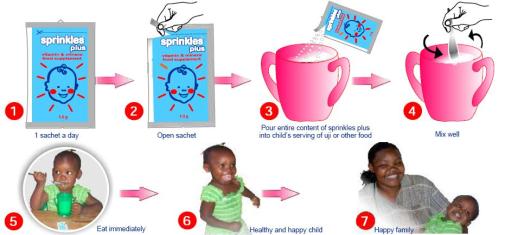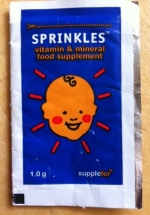The World Health Organization rates malnutrition as the foremost threat to global public health. Each year, over six million children die of starvation, and more than one billion people suffer from vitamin and mineral deficiencies requiring medical attention. Media coverage of malnutrition tends to highlight starvation, but micronutrients (e.g., Vitamins A through E, iron, and zinc) are equally important for child wellbeing. Substantial medical evidence suggests “micronutrient malnutrition” in the first two years of life has a lasting impact via physical and cognitive impairment.
Micronutrient food fortification — adding micronutrients to a person’s everyday food — is one of the most cost-effective public health interventions available today. Unfortunately, most children suffering from micronutrient deficiencies live in rural, subsistence economies that are not easily reached by traditional industrial food fortification (e.g., iodized salt, fortified flour). As opposed to manufacturers adding micronutrients through industrial food processing, at-home fortification with individuals adding their own micronutrients have also been successful. Studies by the U.S. Centers for Disease Control and Prevention(CDC) in rural Kenya demonstrated that at-home food fortification – using micronutrient powders (MNPs) (see photo at right) – was effective in substantially reducing rates of micronutrient malnutrition in these communities. Most interesting, these MNPs were provided using a market-based model where mothers were paid a near-market retail price for the product from door-to-door sales agents. Despite this proven demand, there is currently no on-going supply of MNPs in most countries of the world because of limited coordination between commercial distributors and public health advocates.

A community education tool for teaching mother’s how to use MNPs safely and effectively. (Courtesy CDC)
In January 2012, the Global Alliance for Improved Nutrition (GAIN), industry partners, MBA colleagues of mine, and I met in Nairobi to discuss how to introduce micronutrient home food fortification products to Kenya through a market-based mechanism. The consensus reached was that although support from health authorities existed, the collaborative nature of public health interventions in under-resourced areas would required a very unique business model for market-based MNPs to succeed.
Our team of MBA students helped craft a business plan for GAIN and its private partners that demonstrated the economic feasibility of a public-private partnership model that could provide micronutrient powders across Kenya through a market-based, financially self-sustaining process. Armed with the proper cash flow models, marketing plan, and risk analysis, GAIN’s Kenya Fortified program is currently in the process of securing start-up financing and locating Kenyan commercial operators with the appropriate logistical capabilities for distribution and sales (see video below). Delivery of the first locally-branded micronutrient powders to Kenyan communities is expected in early 2013 (with future production scaled to up to 300 million sachets per year).
Even more exciting than this particular project’s success is the potential for future efforts to deliver similar programs around the world. The basis of the solution above was taking existing opportunities and capabilities and reshaping them to fit a unique market macroenvironment (i.e., rural Kenya). This project demonstrates that although such radical rethinking of business models may be difficult, successful new methods of achieving healthcare goals often lie at the other end of the process.
Disclosure: I have received no monetary or in-kind compensation from my work with GAIN or in promotion of MNPs more generally.

Just released yesterday by Sam Loewenberg on the New York Times’ blog is a wonderful summary piece describing the use of micronutrients world-wide and its lack of general acceptance as a strategic intervention by the international community: http://opinionator.blogs.nytimes.com/2012/09/05/easier-than-taking-vitamins
Micro nutrients home fortification products(Sprinkles) for Nigeria
Sir, Nigeria is one of the leading developing nations with prevalent of anemia iron deficiency and malnutrition among the per-school and pregnant women. I had a first hand experience of recent. my pregnant wife complained of pain in her lower back region and we quickly headed to the clinic. when we got there she complain of dizziness and the doctor on duty took her blood for PVC testing, the result showed she was anemic the PVC was 25% . She had to received blood transfusion. there thousands of cases like these in Nigeria especially in the rural communities that sometime result to unnecessary death of the pregnant women. I have been researching the internet to find a way how as an individual make an impact in my community by bringing sprinkles to Nigeria to distribute and marketing as a social enterprise in my community. Though some state Government have some free health program where free micro-nutrients are distributed to infant and pregnant women. there is much these government can do, and if another Administration comes in it may discontinues the program. When I saw your write up and what you and your colleagues are doing in Kenya. I wanted to ask you if similar thing can be replicated in Nigeria, even if we have to start with one state as a pilot program. Presently there is only one NGO distributing sprinkles in Nigeria through Heinz foundation in one of the Northern state of the country. I am looking at distributing and marketing it in the south west region of the country . I will appreciate this if you and your colleagues and your contacts can make this happen in Nigeria. I hope to hear from you soon. Thanks
ADU FESTUS KOLAWOLE
Lagos, Nigeria
GAIN has active projects in Nigeria, and there current country manager is Larry Umunna. I don’t have any contact information for Larry, but I would recommend reaching out to him via GAIN or any personal networks you have in Nigeria (he also appears to be an active LinkedIn user). In general the organization has been very keen on finding financially sustainable ways of distributing micronutrient powders and with any lucky an email expressing interest will spark a collaborative brainstorming session at the very least. Keep me posted if things move forward or if I can be of any further help.
Pingback: Year in Review – Best of 2012 « Blue Oceans for Health
Green Technologies Solutions is a Namibian based company interested in becoming a distributor for your microtnutrient powder in Namibia.